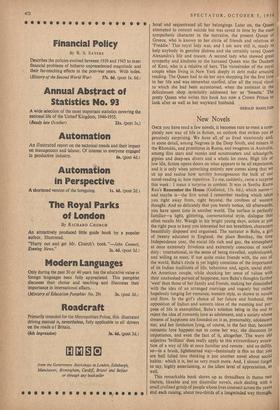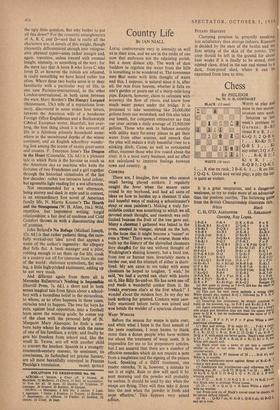New Novels
ONCE you have read a few novels, it becomes rare to meet a com- pletely new way of life in fiction, an outlook that strikes you as genuinely surprising. We have all .of us lived vicariously and, in some detail, among Negroes in the Deep South, and miners in the Rhondda, and prostitutes in Rome, and swagmen in Australia, among film stars and monks and scoutmasters and schoolgirls, gipsies and deep-sea divers and a whole lot more. High life or low life, fiction opens doors on what appears to be all experience, and it is only when something entirely new comes along that we sit up and realise how terribly homogeneous the bulk of our novel-reading is; how repetitive. To me, suddenly, came a surprise this week : I mean a surprise in content. It was in Santha Rama Rau's Remember the House (Gollancz, 13s. 6d.), which seems— and maybe is—the first novel 1 remember reading which takes you right away from, right beyond, the confines of western thought. And so delicately that you barely notice, till afterwards, you have spent time in another world. The surface is perfectly familiar—a light, glittering, conversational style, dialogue that often recalls Mr. Waugh in his bright young days, action at just the right pace to keep you interested but not breathless, characters beautifully disposed and organised. The narrator is Baba, a girl of twenty educated in England, the place Bombay, the time Independence year, the social life rich and gay, the atmosphere at once extremely frivolous and extremely conscious of social duty : international, in the sense of being travelled, sophisticated, and willing to meet, if not quite make friends with, the rest of the world, Baba's circle is yet highly conscious of the importance of its Indian traditions of life, behaviour and, again, social duty. An American couple, while shocking her sense of values with their unabashed pursuit of happiness, turn Baba's thoughts farther 'west' than those of her family and friends, making her dissatisfied with the idea of an arranged marriage and vaguely but rather hopelessly longing for romance, western style, as shown in novels and films. In the girl's choice of her future and husband, the opposition of Indian and western ideas of the meaning and pur- pose of life is exemplified, Baba's solution being in the end to reject the idea of romantic love as adolescent, and a society whose dreams of happiness are founded on it as, presumably, adolescent too; and her limitation lying, of course, in the fact that, because romantic love happens not to come her way, she discounts its importance, and even the fact of it, altogether. The worn old adjective 'brilliant' does really apply to this extraordinary evoca- tion of a way of life at once familiar and remote: and so deftly, so—in a brash, lighthearted way—femininely is this so that you are half lulled into thinking it just another novel about social habits: which it is, but so very much more. And, I almost forgot to say, highly entertaining, at the idlest level of appreciation, as well.
This remarkable book shows up as threadbare in theme two literate, likeable and not dissimilar novels, each dealing with a small civilised group of people whose lives intersect across the years And each raising, about two-thirds of a longwinded way through.
the ugly little question, But why bother to put all this down? For the romantic entanglements of A. B. C and D—and that is really all the characters are, in novels of this weight, though pleasantly differentiated enough into recognis- able physical types—seem rather meagre and, again, repetitive, unless treated with unusual insight, intensity, or something of the sort: for the mere fact that A loves B who loves C who loves D. or however the initials are adjusted, is really something we have heard rather too often. Where these two books score is in their familiarity with a particular way of life, in one case Parisian-international, in the other London-international, in both cases between the wars. Mary Borden's The Hungry Leopard (Heinemann, 15s.) tells of a mysterious love- story, discovered in some stolen love letters, between the American wife of a handsome Foreign Office Englishman and a Buchan-style Chitral European writer. Heartfelt, but over- long, the best thing about it is the account of life in a fabulous princely household some- where in the snowbound depths of the winter continent, and an English schoolboy wander- ing lost among the scores of exotic great-aunts and cousins. F. Tennyson Jesse's The Dragon in the Heart (Constable, 12s. 6d.) is a pleasant tale in which Paris is the heroine as much as the American ilea ex machina who knits the fortunes of two Frenchmen and a girl together through the historical vicissitudes of the last few decades: rather too intrusive local colour, but agreeable light reading for a wet afternoon.
Not recommended for a wet afternoon, being stormy and dank in style and in content, is an extraordinary first novel of American family life, N. Martin Kramer's The Hearth and the Strangeness (W. H. Allen, 16s.). Wild, repetitive, but impressive writing; turgid relationships; a fair deal of madness and Cold Comfort thrown in with a disconcerting deal of promise.
John Boland's No Refuge (Michael Joseph, 12s. 6d.) is that rather pathetic thing, the care- fully worked-out 'idea' novel that appears a waste of the author's ingenuity: the allegory that falls flat. A bank manager and a pilot, robbing enough to set them up for life, crash in a country cut off for centuries from the rest of the world : elaborate symbolism, flat writ- ing, a little high'-pitched excitement, adding up to not very much.
And different again from them all is Mercedes Ballesteros's Nothing Is Impossible (Harvill Press, 7s. 6d.), a short and in both senses Magical tale from Spain about a school- boy with a boundless belief in the miraculous, to whom, as so often happens in these cases, miracles tend to happen. The two fat boys he puts, against loud opposition, into a football team score the winning goals; he comes top of the class with the personal help of St. Margaret Mary Alacoque; he finds a new- born baby whom he christens with the name of one of his familiars, a sylph; and finally he gets his freedom from school and, like the small St. Teresa, sets off with another child to convert the heathen. Spanish in a strangely nineteenth-century manner, its sentiment, its conciseness, its farfetched yet precise fantasy, are all most beautifully conveyed in Frances



















































 Previous page
Previous page